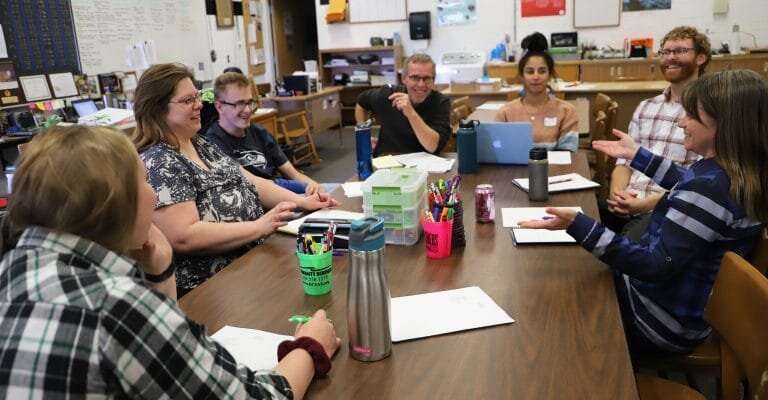In a technology-reliant time, researcher studies why people with disabilities are less likely to use technology
by Science X staff
In a time when people are self-isolating due to COVID-19 restrictions, technology allows people to work from home through Zoom and to chat with friends and family through social media. This is not so for many individuals with intellectual and developmental disabilities (IDD).
"Now more than ever, we all are realizing the power of technology to keep us connected to our communities," said Heather Williamson, assistant professor in the Northern Arizona University Department of Occupational Therapy and the Center for Health Equity Research. "If people with IDD were not already engaged in social media and only connected with their communities through their jobs or the community-based supports they receive, then they are even more isolated now."
Williamson's work exploring technology instruction and use among youth with intellectual and developmental disabilities was recently published in Inclusion, a journal of the American Association on Intellectual and Developmental Disabilities. She collaborated with two other researchers, Kim W. Fisher, a faculty member at the University of Illinois Urbana Champaign and Nichole Guerra, research director for The Resource Exchange in Colorado.
The three met through their connections at the American Association on Intellectual and Developmental Disabilities conference. Fisher and Williamson joined forces in 2015 to first explore Twitter use among people with intellectual and developmental disabilities around the 25th anniversary of the American Disabilities Act.
Their successful collaboration inspired them to expand their work with Guerra and discover why people with IDD were not using technology.
"The problems of social isolation and digital community participation are complex, and they necessitate the interdisciplinary nature of our work," Fisher said. "What's unique about our collaboration is that we come to the issue of participation from different perspectives.
"I come to it from an education perspective with a focus on understanding how people build and use their social connections to get by or get ahead and participate in their communities. Heather comes at the problem from a public health and daily living perspective as an OT, which really emphasizes community participation" she said. "Nichole comes to the problem as both a researcher and practitioner who is actively engaged in supporting individuals and organizations to promote inclusive community participation opportunities. But we all have an interest in the role technology has in social inclusion and community participation and in supporting people with IDD to live their fullest lives."
Using data from the National Longitudinal Transition Study of 2012, the researchers found that technology use for students with intellectual and developmental disabilities was minimal for two main reasons––they hadn't learned how to use social media or they didn't have access to the technology.
They also experience isolation in civic participation campaigns around disability issues such as the Americans With Disabilities Act––a topic that directly affects them, according to earlier work by Williamson and Fisher. The results concerned the researchers because they found that people with IDD already experience higher rates of social isolation and loneliness, and they have small social networks.
Despite their lack of access and training for technology, people with intellectual and developmental disabilities report that they have positive experiences using social media to find and maintain friendships, improve their social identity and engage in activities they enjoy, according to their study.
Williamson said the results were encouraging and that people with intellectual and developmental disabilities could have higher rates of technology and social media use if they were given the opportunity and the training.
"I think for sure family members, teachers and providers can have a positive influence on encouraging use of technology," Williamson said.
The researchers are now working on a grant application to the National Institute on Disability, Independent Living, and Rehabilitation Research to develop and test a digital citizenship curriculum for people with IDD.
"It has never been more important for all of us to connect via technology and we are interested in how individuals with IDD and their families are navigating this under the COVID-19 pandemic," Fisher said.
More information: Kim W. Fisher et al. Technology and Social Inclusion: Technology Training and Usage by Youth With IDD in the National Longitudinal Transition Study of 2012, Inclusion (2020). DOI: 10.1352/2326-6988-8.1.43
Provided by Northern Arizona University